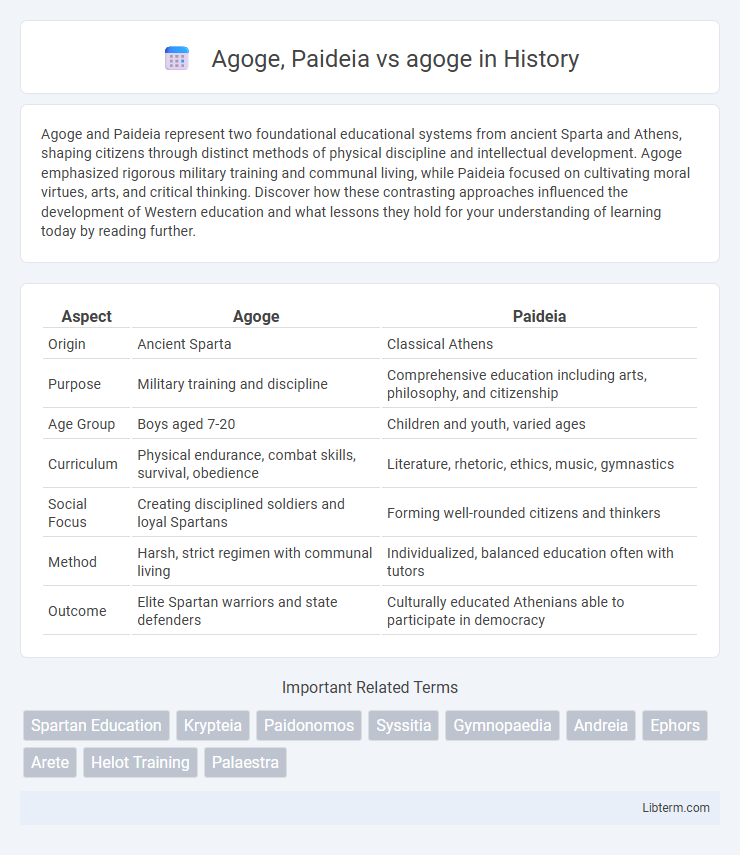Agoge and Paideia represent two foundational educational systems from ancient Sparta and Athens, shaping citizens through distinct methods of physical discipline and intellectual development. Agoge emphasized rigorous military training and communal living, while Paideia focused on cultivating moral virtues, arts, and critical thinking. Discover how these contrasting approaches influenced the development of Western education and what lessons they hold for your understanding of learning today by reading further.
Table of Comparison
| Aspect | Agoge | Paideia |
|---|---|---|
| Origin | Ancient Sparta | Classical Athens |
| Purpose | Military training and discipline | Comprehensive education including arts, philosophy, and citizenship |
| Age Group | Boys aged 7-20 | Children and youth, varied ages |
| Curriculum | Physical endurance, combat skills, survival, obedience | Literature, rhetoric, ethics, music, gymnastics |
| Social Focus | Creating disciplined soldiers and loyal Spartans | Forming well-rounded citizens and thinkers |
| Method | Harsh, strict regimen with communal living | Individualized, balanced education often with tutors |
| Outcome | Elite Spartan warriors and state defenders | Culturally educated Athenians able to participate in democracy |
Understanding Agoge: The Spartan Education System
The Agoge was the rigorous Spartan education system designed to produce disciplined and skilled warriors through intense physical training, communal living, and strict obedience. Unlike the Paideia, which emphasized a well-rounded education including arts, philosophy, and rhetoric in Athens, the Agoge focused primarily on military prowess and survival skills from a young age. This training instilled Spartan values of endurance, loyalty, and martial excellence, shaping citizens into formidable soldiers essential for Sparta's militaristic society.
Origins and Evolution of the Agoge
The Agoge, an ancient Spartan educational system, originated in the 7th century BCE as a rigorous training program designed to cultivate disciplined warriors and loyal citizens. Distinct from the broader Greek Paideia, which emphasized intellectual, artistic, and moral development, the Agoge prioritized physical endurance, military skills, and communal obedience. Over centuries, the Agoge evolved to include Spartan religious rites and socialization practices, ultimately reinforcing the militaristic and oligarchic structure of Spartan society.
Key Features of the Agoge Training Regimen
The Agoge training regimen, central to Spartan society, emphasized rigorous physical conditioning, endurance, martial skills, and communal discipline to forge resilient warriors capable of enduring hardship and battle. In contrast to Paideia, which focused on broad intellectual, moral, and cultural education across various Greek city-states, the Agoge prioritized survival, combat proficiency, and loyalty to Sparta above academic learning. Key features included early-age enrollment, harsh physical challenges, weapons training, social cohesion through group living, and strict obedience to Spartan laws and ethos.
Paideia: The Classical Greek Educational Ideal
Paideia represents the Classical Greek educational ideal, emphasizing holistic development through intellectual, moral, and physical training to cultivate virtuous and well-rounded citizens. Unlike the Agoge, which focused primarily on rigorous military training and discipline in Spartan society, Paideia aimed to foster critical thinking, artistic appreciation, and ethical reasoning across all aspects of life. This comprehensive approach shaped the foundation of Greek philosophy, politics, and culture by integrating education, character formation, and civic responsibility.
Core Principles of Paideia in Ancient Greece
Paideia in ancient Greece centered on holistic education, nurturing intellectual, moral, and physical development through dialogue, critical thinking, and cultural knowledge. Unlike the Agoge system of Sparta, which emphasized rigorous military training and discipline, Paideia aimed to cultivate virtuous citizens by fostering ethics, rhetoric, and civic responsibility. Core principles of Paideia included arete (excellence), sophia (wisdom), and kalokagathia (harmonious balance of beauty and goodness), integral to shaping well-rounded individuals.
Comparing Agoge and Paideia: Philosophies and Purposes
Agoge was a rigorous Spartan military training system designed to instill discipline, endurance, and loyalty for warfare, emphasizing physical strength and obedience. Paideia, rooted in classical Greek philosophy, aimed at holistic education, cultivating intellectual virtues, moral values, and civic responsibility alongside physical development. The primary difference lies in Agoge's focus on creating elite soldiers, whereas Paideia nurtured well-rounded citizens prepared for diverse societal roles.
Social and Cultural Impacts of Agoge vs Paideia
Agoge, the rigorous Spartan military education system, fostered discipline, loyalty, and communal identity essential for Sparta's militarized society, shaping a culture centered on strength and austerity. Paideia, the Athenian educational model, emphasized intellectual development, civic responsibility, and cultural refinement, leading to Athens' flourishing arts, philosophy, and democracy. Socially, Agoge reinforced a collective warrior ethos, whereas Paideia promoted individuality and critical thinking, resulting in distinctive cultural legacies influencing Western civilization.
Agoge and Paideia: Shaping Citizens and Warriors
Agoge was the rigorous Spartan education and training system designed to shape disciplined warriors through physical endurance, combat skills, and communal living, fostering loyalty and obedience to the state. Paideia encompassed the broader Greek ideal of holistic education, emphasizing intellectual development, moral values, arts, and civic responsibility to produce well-rounded citizens. While Agoge prioritized military excellence and social conformity, Paideia aimed to cultivate critical thinking and ethical citizens capable of contributing to democratic society.
Legacy and Influence of Agoge and Paideia in Modern Education
The Agoge and Paideia systems represent foundational educational methodologies from ancient Sparta and Athens, respectively, influencing modern pedagogy through their emphasis on holistic development and civic responsibility. Agoge's rigorous physical and military training has inspired contemporary discipline-focused programs, while Paideia's integration of intellectual, moral, and artistic education underpins liberal arts curricula worldwide. Both models contribute enduring legacies that shape modern educational philosophies prioritizing balanced development of body, mind, and character.
Lessons from Agoge and Paideia for Contemporary Society
The Agoge system of ancient Sparta emphasized rigorous physical training, discipline, and communal loyalty, fostering resilience and endurance that can inform contemporary educational models prioritizing character development and teamwork. In contrast, Paideia, rooted in classical Athens, focused on holistic intellectual and moral education, promoting critical thinking, ethics, and civic engagement, relevant for modern curricula aiming to cultivate well-rounded, socially responsible individuals. Lessons from both systems highlight the importance of balancing physical vigor with intellectual growth, suggesting contemporary society benefits from integrated education fostering both personal discipline and civic virtue.
Agoge, Paideia Infographic

 libterm.com
libterm.com